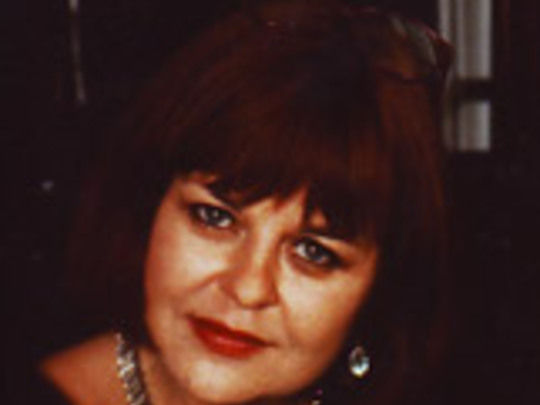
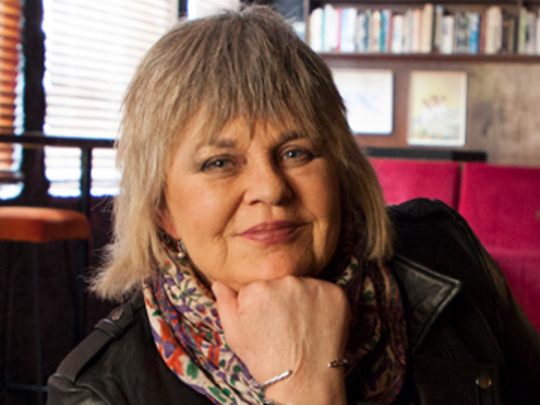
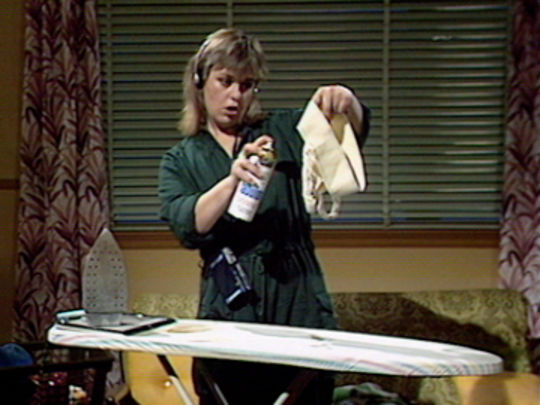
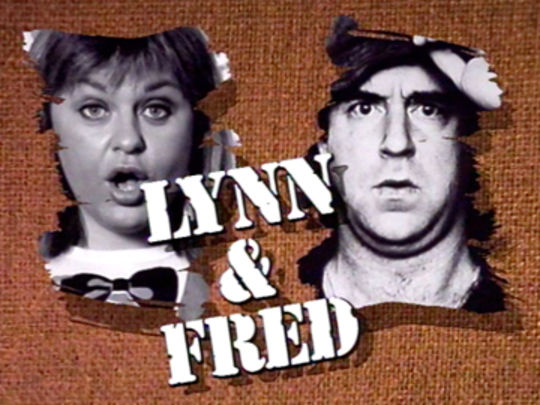
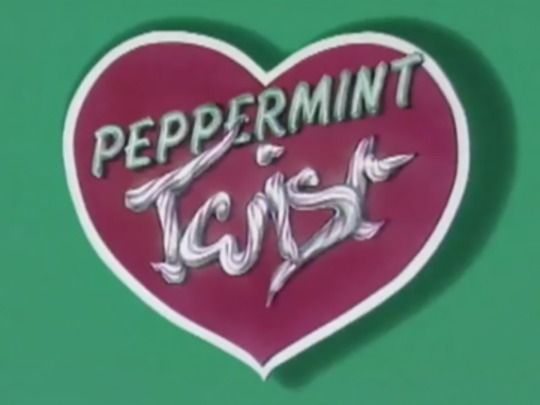
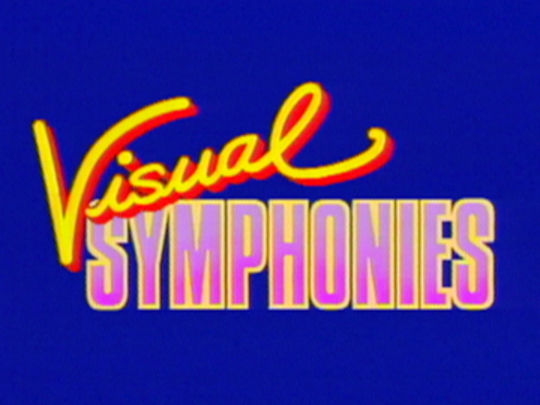
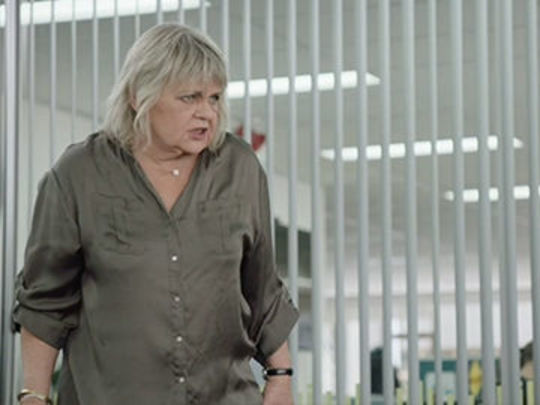
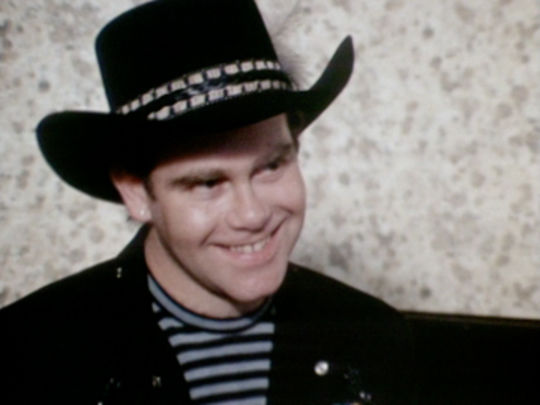
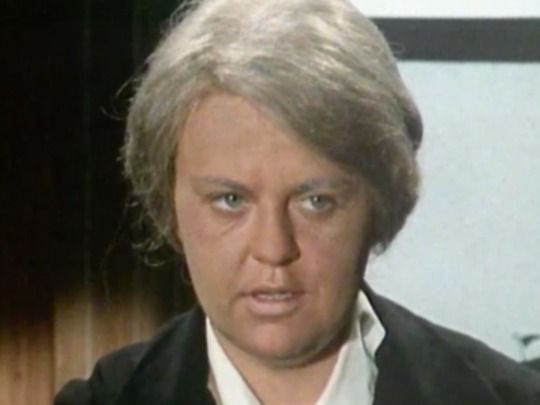
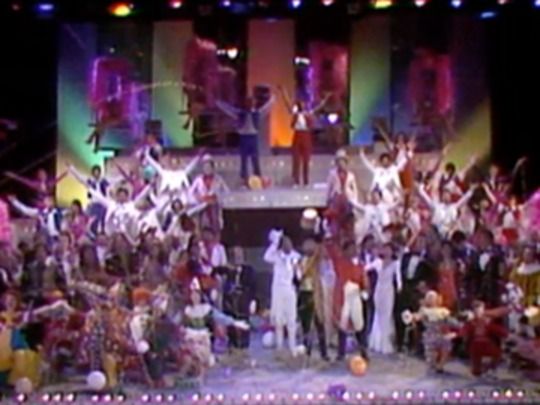
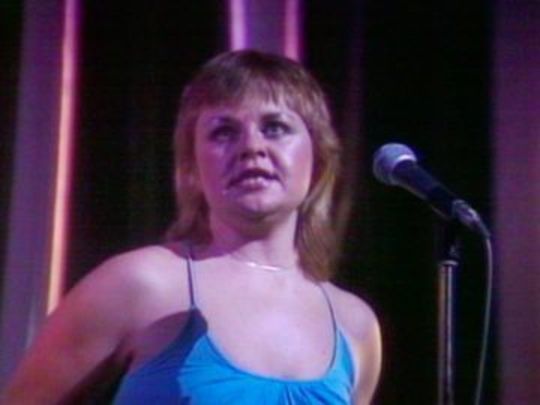
The Ginette McDonald Collection
The Ginette McDonald Collection
This collection has three backgrounds:
Tributes from Fans and Friends
Sounding Local

Writing about My Sister
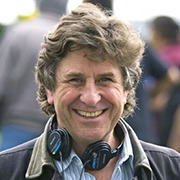
Tributes from Fans and Friends
By NZ On Screen team 18 Apr 2024
Writer/producer Paul Horan on Outrage and Gall
The extraordinary career of Ginette McDonald is a study in disregard. At almost every point in her career she would have been thwarted, had she not consciously and at times fiercely disregarded the overbearing strictures of being a creative in New Zealand.
Lynn of Tawa, a piece of comedy that has become part of our culture in a way that few pieces of comedy ever have, was often seen as a bit mean. Which is proof that it worked. It is hard to imagine now the outrage that followed each of her appearances. The nation clutched its pearls. Letters to the editors were written saying "That’s not us!", "That’s not how we should be seen!", and "What if visitors from overseas saw this?!". Ginette and her brilliant collaborator, her brother Michael McDonald, enjoyed it for a while then just moved on.
This collection will show the extent of an extraordinary career, not just the satire. But to many of us starting out in comedy, it was the sheer gall of Lynn that mattered most. Ginette taught us that at times, New Zealanders can be a strangely fickle and insecure bunch. When showing them to themselves, proceed with absolute and flagrant disregard.
Actor/comedian Tom Sainsbury on Leaning into Kiwiness
Ginette McDonald is an absolute icon. I’ve watched her interviewing Elton John as Lynn of Tawa too many times; I’m just in awe of her audacity and boldness during it. I also grew up with Lynn fronting all the Mitre 10 ads. They’re still vividly in my brain. Ginette was fundamental for me being aware of Kiwi-ness but also that you could take the piss out of being Kiwi. And it’s for this reason that I owe her a lot, especially really leaning into the kiwi accent. Her delivery is just delicious and in stark contrast to how she speaks in real life.

Lynn of Tawa & Elton John, in Lynn's 1980 one-off TV special.
The only time I’ve had the pleasure of sharing a screen with Ginette was on Give Us a Clue in 2021. She really threw herself into the charades, rolling around on the floor — I believe she was being a dog at one stage? In the downtime, you’d be teasing her, or telling a joke, and she’d look at you with a stern face and then — sharp as a tack — rattle off a quip to bring you right down to size.
Oh, and who can forget her hosting Ground Force? She was unapologetically herself in that show. She was bonkers. And I loved it. I’ve said it before and I’ll say it again: Ginette McDonald is an absolute icon.
Actor/director Susan Wilson on Stories of Jaw-Dropping Hilarity
Ms G. McDonald, dearest friend, colleague and fellow life traveller since the early 1970s — yes, last century! Never without loving observations and kind, comforting words; never without encouragement and joy. She's always ready with a juicy anecdote, outrageous observation, or saga of jaw-dropping hilarity. We've so often shared our lives via stage, screen and radio. An extraordinarily special soul, talented beyond belief. A comedienne of genius I'm so privileged to have met and journeyed with.

Ginette McDonald & Susan Wilson in play Travesties (1975).
Ginette's recollections will amuse you endlessly. You'll feel better for hearing them. Ask her to recount some unfortunate stage mishap — like that time at Downstage Theatre when, as Cecily and Gwendolyn in Travesties, with tottering feet and rattling teacups, we attempted our rhythmic journey across the raked Downstage walkway, trying to keep time with Tom Stoppard's brilliantly witty words and music; or maybe another crisis on a tricky Downstage set — this time a revolving stage, with all the cast trapped when the door handle broke on the only exit.
There are also the stories which ought not be told: the ones Ginette will insist on recalling with such delight and verve, the ones that bring you tears of gladness and not regret. Supply the topic and the moment, and there she goes: an unstoppable force for the good of your soul.
Journalist/Legal Researcher Judith Fyfe on Being Funny and Female
There was Fred Dagg, and there was Ginette McDonald, or Lynn of Tawa. Netty was a quantum leap in comedy in New Zealand. Until then the only female comedians on television were American — Lucille Ball, Mary Tyler Moore, Phyllis Diller etc. Lynn of Tawa was fresh, funny and recognisable.
Netty came to comedy from a long and successful career in the theatre. She was probably a teenager when I first saw her at Downstage Theatre in Wellington. During the interval she was selling...possibly ice creams, or perhaps she was serving tables. But even at that stage, she was talked about as someone with a significant future in theatre (just not on the retail side!).

Lynn of Tawa's TV debut, on a 1979 Good Day special.
Despite my memory wobbles, I think that the Lynn of Tawa persona really took off when I asked Netty to contribute to a local version of a celebrity roast, for eclectic daytime show Good Day. She took part as Lynn of Tawa, and was terrific. In collaboration with her brother Michael, she went on to become a major star of Kiwi television — a highly recognisable and much loved celebrity.
Knowing Netty, I'm well aware how hard Netty worked, to create and be Lynn of Tawa. The persona was cheeky, smart but naive, awkward and immediately likeable. She didn’t create divisions in audiences, which is rare. And she was likeably funny — hopefully even for those residents of Tawa who might have felt a little prickly about Lynn’s view of their suburb.
Netty also had many serious acting roles, and worked as a director; but I guess she will forever be remembered as Lynn of Tawa. My favourite Lynn moment is the 1981 Royal Variety show, where she faced possibly one of the toughest audiences she ever had. She was breath-holdingly brilliant.
Director Peter Sharp on Understanding Drama
A few words about Ginette McDonald/Lynn of Tawa? I’m not sure that I know either of them. I do know Netty McDonald. In the 1980s I directed a number of series in Wellington at a time when Netty was adding directing and producing to her skills. There was a very strong social atmosphere in those days at Avalon, and we became friends.
I leapt at the opportunity when John McRae offered us the chance to work together on the Maurice Gee script The Fire-Raiser. You couldn’t find a more dedicated, involved producer: our first production meeting was two days after she left hospital after giving birth to her daughter Kate. But her greatest strength came from her years on stage in front of audiences, and an inherent understanding of what works. Even early drafts of scripts showed her positive input and, more directly for me, her views on casting, rushes, and editing. Though, lest this sound like a mutual admiration society bulletin, there were healthy, vital disagreements. If only I’d listened to Nettie, a pre-Oscar Cuba Gooding Jr. would have co-starred in The Champion.

TV series The Champion (1989). Photo courtesy of TVNZ
More importantly, though, she left me alone to do my job; no sitting on my shoulder or micromanagement. The Fire-Raiser enjoyed lots of success and we went on to another Maurice Gee story. To my mind The Champion was an even better production. Experience counts. Nettie and I collaborated on six productions in total, including her appearance as star (and producer) of Her New Life, a monologue by Fiona Samuel. That was Netty at her best: a big personality, lots of heart, honestly felt emotion, and fun. There’s always a lot fun with Netty. Well, she was Lynn of Tawa.
Sounding Local
By Michèle A'Court 18 Apr 2024
Plenty of us grew up with someone in our family who had "a telephone voice" — a fancier version of their usual way of speaking, the vocal equivalent of their Sunday Best. A somewhat rounder vowel, a crisper consonant, possibly going the whole hog of putting the "h" sound before the "w" in a word like "somewhat".
As a nation, we’ve never been sure that we love the way we sound. Early on in our broadcasting history, people who talked for a job were instructed to aim for something close to British received pronunciation. That’s how we sounded on the radio and TV news, and at public events, or when we were answering the phone in case it was someone we needed to impress.
So you wouldn’t want to underestimate the impact of the moment in 1981 when, in a live television spectacular broadcast from Auckland’s St James Theatre into the nation’s living rooms, we talked like ourselves in front of the Queen.
Ginette McDonald’s Lynn of Tawa was — I reckoned then, and still do — the jewel in the crown of that Royal Variety Performance. [Lynn starts 17 minutes into part three]. Lynn arrived in the middle of a massive showcase of pretty much everything New Zealand had to offer. We’d already shown the Queen and Prince Philip what we could do with top hats and canes, opera, ballet, sketch comedy and more country music than you could reasonably poke a stick at. The show was big, glitzy and so international that at most points you wouldn’t have known it was happening in the Antipodes. I’m guessing that was the plan.

Lynn of Tawa at the 1981 Royal Command Performance.
It doesn’t get much simpler — or riskier — than one person on stage, talking. Resplendent in a sky-blue harem-pant and shoestring-strap confection, Lynn adjusts the mike, checks it's working by saying "Wer-kung?", parks her chewing gum to one side as she bobs a "Good evening Your Majesty", and does a quick shout-out to her mum. New Zealand holds its breath — is this going to feel ok? What do we see when we look at ourselves while the Queen is watching?
"My name is Lynn and I come from a little place called Tawa?" she begins shyly, every line tonally a question. "We were the ones who sent you the paua shell tiara for a wedding present? You know, the one with the two rampant Kiwis holding the word ‘Progress’ between their beaks? And the matching cruet set? Do you remember that?"
Somewhere before "cruet set", everyone has decided. At home we love it, and the live audience loves it, and there's a moment that it's clear she knows she’s nailing it — there’s a twinkle and genuine glee in her smile.
Ginette talks about that night in her very excellent Funny As interview; about being able to surf the waves of laughter and spontaneous rounds of applause. She’d been a late addition to the lineup after a female impersonator got the flu, so the fact it was a triumph would have been even more satisfying — one of those cheerful "f**k you" moments you get in an industry that can be slow to give women opportunities.

All Things Being Equal: Ginette McDonald & Simon O'Connor.
This wasn’t the first time Ginette had been on our screens by any means. She was a teenager in the very first episode of local drama Pukemanu in 1971, but I wasn't allowed to watch it (I was 10, and possibly in bed). But I definitely saw her in Close to Home, our first ever soap opera, which ran from 1975 and was appointment viewing at our home for years. And in my last year of high school I devoured All Things Being Equal, the feminist sitcom penned by my favourite Listener columnist and cartoonist Rosemary McLeod with Ginette in mind (Rosemary had noted Ginette's dramatic and comic skills, long before Lynn of Tawa).

Publicity photo from 1987 TV series Peppermint Twist.
I sort of met Ginette when I was working at Avalon in the mid-1980s in the publicity department, and she was working as a producer and director, creating dramas like Peppermint Twist which were way before their time in terms of style and aesthetic. This was also when women were only just breaking into directing and producing, and they were tough gigs in what was then (and often still is) a male-dominated industry. I was slightly overawed by her, as I was again in the 1990s when we both found ourselves doing those touring comedy debates with Gary McCormick, David McPhail and Jon Gadsby.
We’ve bonded in many green rooms since — in particular at one of those small-town events where the organisers put us both up at a really fancy boutique resort in the middle of nowhere, which was tremendously kind...but then left us there all day with no access to food, and no transport to get any. Ginette, it turned out, had a sandwich in her handbag and cheerfully gave me half. I feel like we’ve been mates ever since. She tells the very best backstage stories, the kind you want to stay and listen to, instead of starting the show.
My mother Donna used her Telephone Voice most days, and not just on the phone. Donna sent me off as a teenager to local speech teacher Mrs Parrington to sort out my vowels in a Trinity College of London way. We were all terribly disappointed when later, as a journalism student, I did a voice test for Radio New Zealand and the report came back "Strong New Zealand accent" and we knew I would never read the news. Despite this, my mother was one of the people who had watched the Royal Variety Performance in 1981 and felt enormous pride as Tawa’s Lynn invited the Queen to the opening of the local paddling pool. She knew a successful command performance when she saw one.
It was one of many things our household admired Ginette for — there was also a gardening show, a travel series, and those debates. Plus a terrific trip that Donna and I took to Wellington in 2018 to see Ginette at Circa in Joan, penned by my other favourite Listener columnist and cartoonist, Tom Scott. This play about Tom’s mother also starred Ginette’s daughter, Kate McGill. Afterwards, Donna, Ginette and I had a glass of wine together in Circa’s bar. It seems mad that you can just hang out with a cultural icon, but you can.

Kate McGill and Ginette McDonald in Tom Scott's 2018 play Joan.
So theatre, serious drama, TV presenting, work in front of and behind the camera. Plus a Lynn of Tawa TV special and a series, and the unforgettable 60 seconds of unmitigated joy that was the Mitre 10 TV commercial in 1985, which had a whole nation saying "now cut that out, Madonna".
Fred Dagg had arrived on our screens a little earlier, and in my head they have always been a perfect pair. Salt and pepper shakers — a paua shell cruet set if you will — of our rural and urban voices, him all disappearing consonants, her all dissolving vowels.
You know you’ve reached some level of maturity when you can laugh at yourself. Loving Fred and Lynn meant we were beginning to show signs of growing up.
- Michèle A'Court is a writer, presenter, actor and comedian, whose TV work includes 7 Days, Shortland Street and What Now? In 2010 the NZ Comedy Guild named her New Zealand's Female Comedian of the Decade.
Writing about My Sister
By Michael McDonald 18 Apr 2024
In writing about my sister, I'm aware that the reader might assume a certain partiality on my part. I will try to be as objective as I can. However, the fact remains that Ginette is an extraordinary talent and a unique creation. A lifetime of awards, achievements, glowing reviews, public fame, and even an ONZM, attest to it. She remains a force of nature. Her singular intelligence, extraordinary sense of humour, and dynamic performance skills are as acute as ever.
We were born three and a half years apart. I was the second and she was the third of a mixed bag of seven. Our father was an eccentric GP — we loved him dearly. Our mother was a vibrant mix of her own parentage; cool, snobby and English on the one hand, and dramatically Gallic on the other. One never knew quite which would emerge. Outwardly we were a relatively conventional middle class family. Within the unit, however, was a hot mess. Strong characters, much screaming, furious fighting, and a great deal of immoderate laughter washed down by gallons of alcohol.

In the make-up chair for 1970s soap opera Close to Home.
Although technically Catholic, there was precious little religion going on. Lack of reverence seemed to be our family’s stock in trade. Our father was the most widely read person any of us knew. We had a real library and were told always to use it. The shelves groaned with every sort of book; from Tintin to Tacitus, Thackeray to outright pornography. Everything and anything could be — and was — discussed in our house. This is the crucible from which Ginette emerged. But she managed to make the rest of us look positively pallid.
To say that Ginette was not an easy child is radically to understate the case. Relations between her and her parents, and her and her siblings, often resulted in scenes reminiscent of the collapse of the Hikurangi Fault. Her need for attention and her constant bucking against the system were, in hindsight, necessary attributes of what was to be her outstanding talent. Great performers are rarely, if ever, tractable and compliant personalities. They are not like the rest of us.
I can draw a direct line between Ginette’s restless and performative personality, and her maternal grandmother. Big Net was a tumultuous child. At 17, she fled her well-off family in Paris, crossed northern France at the height of World War l, and hit England. She never saw her family again. She found her way into stage musicals and movies. The snippets we have of this period are suggestive of a pretty wild time of parties, champagne, dancing and romancing, especially in the heady days following the war. The point is that — as similar as they were in many ways — Big Net and Little Net never got on. Perhaps Ginette One saw her young bolshie self reflected in Ginette Two, and didn't like to be reminded of it.

Play Private Lives (1968), directed by Antony Groser.
Netty left school early. Schoolwork did not interest her, except for English, in which she gained impressively high marks. At 16 she found herself the youngest professional actress in New Zealand, playing the maid in Noel Coward’s Private Lives at Downstage Theatre. Also in the cast was Bruce Mason, New Zealand’s preeminent playwright. He was always a staunch supporter of Ginette, and encouraged what he knew to be a special talent.
Ginette credits Bruce for giving her the idea to 'do' a New Zealand accent. Because she had such a good ear, and because our home was such a fertile ground for these experiments, she quickly developed something which had likely never been attempted for comic effect before — the voice of a young urban Kiwi female.
Across town, I was at university with John Clarke — who like Ginette, was often treated as an unruly pest by authority figures. At pretty much the same time Ginette was nailing the Lyn of Tawa voice, John was developing the voice of the laconic rural male which was to become Fred Dagg. In the development of New Zealand comedy, this was an interesting planetary alignment.
In the late 60s, Clarke, Netty, Roger Hall, Paul Holmes, John Banas, and Dave Smith were among the performers in a series of late night satirical reviews at Downstage. The Knickers and (later) Knackers revues were resoundingly successful; queues went round the block.
Lyn of Tawa* was given her first public outing in Knickers as a monologue, in 1968. The following year she took over the PA system during Knackers. Talkback radio was a new phenomenon in those days. Started in Wellington in 1966 by Doreen Kelso on 2ZB, Telephone Time was pretty much the first occasion that the great unwashed Kiwi accent got its own public space. Callers introduced themselves with some version of "Hello Doreen, it’s Norah here. Norah of Woburn" or "Hello Doreen, it’s Pam of Strathmore" and so on. The whole thing was ripe for satire, and Netty provided it. In the dark, while the sets were being changed, she took over the PA system and, with the immortal words "Hello Doreen. It’s Lyn here. Lyn of Tawa", a brilliant comic persona announced herself. And almost immediately vanished from sight.

Ginette McDonald and John Clarke in London, 1973.
Like all of us in those days, Ginette yearned to see the world. In particular, she wanted to pursue her acting career in England. Clarke and I had already gone and set up base camp in London. It was a one bedroom flat, recently vacated by Rolf Harris. By the time Netty arrived, Clarke and I were in a state of moral and alcoholic decline.
Netty was more focussed. She soon had an agent and was getting work. She also prodded a supine Clarke to audition for The Adventures of Barry McKenzie — a Bruce Beresford/Barry Humphries film about an ocker in London. This proved to be another important step in Nobby’s dawning appreciation of his own unique talents.
Netty was in London for roughly five years. She steadily gained recognition and work in television, commercials, radio and the stage — including her moment of greatest triumph, playing Susan in a highly successful Royal Court Theatre production of Don's Party. She worked with all sorts of people — Sophia Loren, Richard Burton et al — but it was a hard life between gigs, and she decided to return home.
Back in New Zealand she almost immediately landed the role of Shirley in the country's first long-running soap, Close to Home. Quickly gaining a national profile, she was soon in demand in all her old haunts of theatre, radio and TV drama — performing, and later directing and producing. For close to 50 years she has been a household name.
It was in 1979 that Lyn of Tawa made her reappearance; this time in person. The occasion was a TV special, The Judith Fyfe Celebrity Pot Roast Show. Fyfe was a TV personality of the time. The 'pretend 'roast' used fictional characters from her fictional past. Netty rang, asking for ideas, and I suggested she play Judith’s old school friend. Netty ordered me to write her a script. Argument being futile, I dashed off a few lines and suggested she dig up her old Lyn of Tawa voice. Her performance was so charming and nuanced that she became an instant hit. Over the next few years there were numerous appearances on TV and in public.

Lyn of Tawa on Good Day (1979), in her first TV appearance.
The event that really launched Lyn into the wider public consciousness was the 1981 Royal Variety Performance in Auckland. What’s largely forgotten is that the powers that be didn't want her anywhere near the thing. A sensitivity about accents was still alive in some quarters, and she was deemed altogether too common to present to Her Royal Highness as a representative of the average Kiwi sheila. Instead they chose a drag queen named Diamond Lil. When Lil got crook, Netty was hauled in to fill the spot at the very last minute. In the event, she stole the show entirely.
But that’s Ginette. She has magnetism and a presence that’s both unique and difficult to ignore. I've been lucky enough to have known some of the best storytellers of my generation. Ginette outranks them all. She can turn a trip to the corner shop into a comic epic which will have listeners gasping for breath. Her medical misadventures are jaw-dropping. Anyone who has listened to her extemporising about some mundane event in her life, elevated to the realms of comic art, will know exactly what I’m talking about.
Ginette’s performative life has covered everything from Shakespeare to Chekhov; Albee to Shaw; high tragedy to low comedy; classic drama to experimental theatre. She’s been involved from the outset in ground-breaking New Zealand television — from acting in Pukemanu, the country's first drama series, to Close to Home, the first soap; plus of course, Lyn of Tawa, the first female comic soloist. She’s also produced and directed award-winning TV drama, and been awarded the country’s highest performance honours. She’s done it all, brilliantly and memorably. She is one of New Zealand’s best ever actresses. One sometimes wonders, though, to what extent that has been fully appreciated in the homeland which she loves so much.
To my mind one of the most admirable aspects of Ginette’s character is her generosity. She would literally give someone the shirt off her back, if their need was great. Many times I've heard her offer unstinting praise for another’s performance or talent, even if she doesn’t care greatly for that person as an individual. This is rare in her profession. It is an expression of a sound character, and a truly generous spirit.
It also suggests that — with a range of talents like hers — she has little need to be envious of anybody.
- Michael McDonald worked on the scripts for Lynn of Tawa's 1980 special, 1982 TV series and 1991's Visual Symphonies, which he also directed. He produced award-winning documentary My Name is Jane.
Postscript by Ginette McDonald
He would say that wouldn’t he. And being main scriptwriter for Lyn of Tawa requires dramatic flair. But as the royal family said of Harry’s memoir, "recollections may vary".
I had wonderful mentors in TV; Ross Jennings, John McRae and Malcolm ("comedy is a serious business") Kemp, all of whom allowed me to train in television production when opportunities for women were less frequent.
Today, working with younger actors and film crews is a joy. Their discipline and dedication is awesome. To watch my own daughter Kate McGill and her peers glide between acting, casting and directing with confidence shows how far the New Zealand industry has become. We all learn from each other. A big crazy family. He tangata he tangata he tangata.
*Michael McDonald wishes everyone would spell it Lyn of Tawa. The character's debut TV special and TV series both spell it Lynn. McDonald got his own back when he directed 1994's Lyn of Tawa - In Search of the Great New Zealand Male.